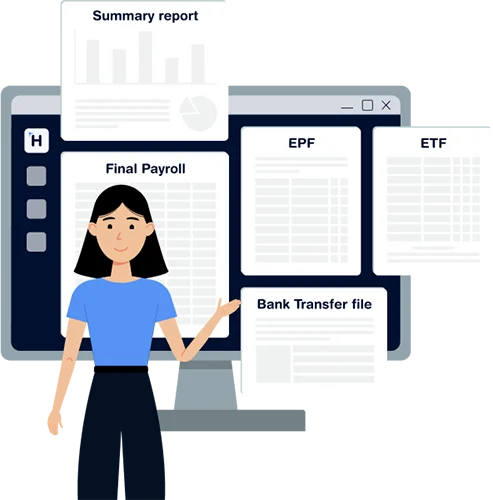Sri Lanka possesses various social security schemes for employees belonging to the private and public sectors. Similarly, gratuity is one such social security scheme in Sri Lanka which is essential for growing small businesses in terms of rewarding employees for their services for 5 years or more in the same business.
What is gratuity?
Gratuity is a social security scheme for private-sector employees governed by The Payment of Gratuity Act No. 12 of 1983. Employers must pay an amount as gratuity for employees who have worked for 5 years or more in the same workplace before being terminated within 30 days.
What is the difference between a pension and gratuity?
A pension and gratuity might be mistaken to be the same for some businesses as both are a sum of money provided to the employees when they retire from their jobs. However, both hold significant differences, which are essential for small businesses to be aware of.
| Pension | Gratuity |
| A pension is a monthly sum provided to a retired employee by the employer and is usually little in quantity. | Gratuity is a lump sum paid to an employee after completing 5 years or more in the same workplace. However, the amount depends on the years of service. |
| A pension is provided to an employee when their duration ends at a certain age. | A gratuity is a lump sum payment given to an employee to appreciate their work and commitment to the company when it’s time to retire. |
| They are mainly provided to government sector employees. | They are mainly provided for private-sector employees. |
| Public sector employees should have 120 months of unbroken service from a permanent pensionable post to be eligible under the pension fund. | Private sector employees should complete 5 years or more to claim gratuity under the same job. |
Therefore, based on the above table, which outlines the differences between a pension and gratuity, small businesses need to keep in mind that, mainly based on the sector of employment to which their business belongs, gratuity and pension are to be awarded to employees accordingly.
Next, we will consider The Payment of Gratuity Act No. 12 of 1983 to understand gratuity further.
The Payment of Gratuity Act No. 12 of 1983
The Payment of Gratuity Act No.12 of 1983 provides for the payment of gratuity by employers to their employees based on the amendments made to the Land Acquisition Act, the Land Reform Law and the Industrial Disputes Act. The Payment of Gratuity Act No.12 of 1983 has two parts:
- Part 1 applies to plantation workers whose employment ceased after the take-over of estates or lands placed in the Land Reform Commission.
- Part 2 requires employers who possess 15 or more employees on any day during 1 year period to pay gratuity.
To understand how gratuity operates in Sri Lanka, you can download this pdf on the Payment of Gratuity Act No.12 of 1983. Payment Of Gratuity Act No 12 of 1983. pdf
How to calculate gratuity for small business employees?
Suppose the employee has completed 5 years or more before termination. In that case, the small business should pay the particular employee within 30 days, that is half a month’s salary for each year of completed service. Gratuity needs to be calculated against the last month’s wage obtained by the employee.
It’s important to note that the following workers are not to be taken into consideration when calculating gratuity:
- Domestic workers.
- Personal chauffeurs.
- Employees of co-operative societies.
- Employees who are entitled to a pension under any non-contributory pension scheme.
- Employed workers under the Indian Repatriates (Special Provisions) Law of 1978.
- Any business employing less than 15 employees during a 1-year period quickly precedes a worker’s termination.
How can a small business make a gratuity payment?
When making gratuity payments, small businesses should keep these two important points in mind:
- Unlike in EPF and ETF, there is no application form to make a gratuity payment. Thus you don’t have to pay any application fee for gratuity either since no application form exists. However, if an employer defaults on the gratuity payment, an employee can submit a complaint to the Labour Office in the area where the business is located.
- When making a gratuity payment, a business should collect supporting documents such as the employee’s salary slip for the last month, employee’s affidavit and attendance register (only necessary in the circumstance).
Considering how a small business makes gratuity payments, we will next consider what happens if your small business doesn’t remain compliant with gratuity payments.
What happens if my small business accounts for gratuity payments of staff don’t remain compliant?
Suppose you don’t ensure that the gratuity payments of your small business staff remain compliant, the following penalties will be imposed under s 15(1) of the Payment of Gratuity Act No. 12 of 1981:
- A fine not exceeding Rs. 500 shall be imposed on the order of the Magistrate Court.
- A person can be imprisoned for not more than 6 months.
- An individual can be subject to both fines and imprisonment.
Keep in mind that s 15(1) of the Payment of Gratuity Act No.12 of 1981 is applicable for violating any provisions in the Act as well.
Therefore, by considering the above information in this article on gratuity, we hope you understand the importance of gratuity for your small business.
Resources
https://askanydifference.com/difference-between-pension-and-gratuity/
https://salary.lk/labour-law/social-security/social-security-and-pensions-1
http://www.labourdept.gov.lk/index.php?option=com_content&id=206&Itemid=33&lang=en

